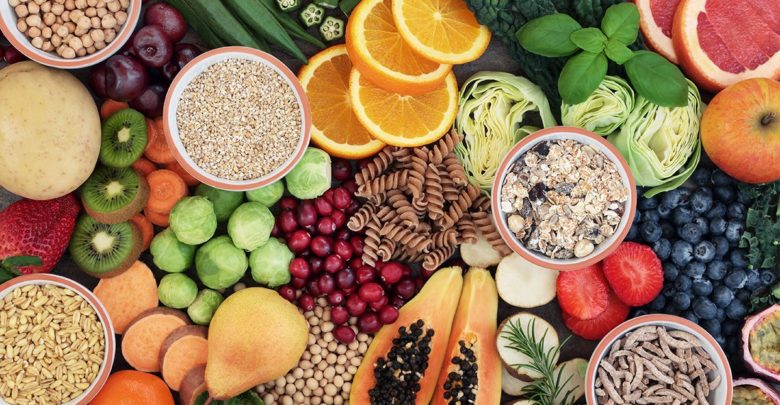The tremendous health advantages of a plant-based diet, commonly referred to as a vegan or vegetarian diet, have helped it become more and more popular in recent years. In a plant-based diet, whole, unprocessed plant foods such as fruits, vegetables, legumes, whole grains, and nuts are the main components of the diet.
Standard plant-based eating plans include:
A vegetarian diet (also known as a meatless diet) excludes all animal products.
A vegan diet is a form of vegetarianism that forbids the consumption of both meat and animal products like milk and eggs.
A diet that is mostly vegetarian but also incorporates seafood is known as a pescatarian diet.
In a 2006 study published in the journal Nutrition, authors Berkow and Barnard13 arrived at the finding that adopting a vegan or vegetarian diet can be remarkably successful at obtaining optimal health.
The researchers uncovered compelling evidence suggesting that individuals who adopt vegetarianism are less prone to several chronic health conditions. These conditions include obesity, which is a major risk factor for various diseases, such as diabetes, high blood pressure, and heart disease. The lower incidence of these health issues among vegetarians suggests that their dietary choices may contribute to improved overall health and well-being.
In this blog, we will explore the health benefits of a plant-based diet, its protein sources, and nutrition.
It is a diet that is gaining popularity among health-conscious people who wish to enhance their well-being, lower their chance of developing chronic diseases, and contribute to environmental protection.
Adopting a plant-based diet has several advantages for achieving optimum health.
Here we have listed out a few of the main advantages:
1. Subtracts Threat of Chronic Diseases
A plant-based diet has been demonstrated in numerous studies to help lower the risk of chronic illnesses like heart disease, type 2 diabetes, and some types of cancer. This is due to the fact that plant-based diets are abundant in antioxidants, fiber, and other nutrients that aid in disease prevention.
For instance, according to research that appeared in the Journal of the American Heart Association, those who ate a plant-based diet had a 16% lower chance of getting cardiovascular disease than people who had a diet high in meat.
2. Reduced inflammation
Persistent inflammation can cause a number of medical issues, including cancer, heart disease, and arthritis. Anti-inflammatory foods such as antioxidants, phytochemicals, and fiber are abundant in plants. Therefore, a plant-based diet can aid to lower inflammation in the body.
Contrary to popular opinion, plant-based diets can also offer the body all the essential proteins. Excellent plant-based sources of protein include tofu, nuts, seeds, and legumes.
3. Improved stomach health
In terms of immunity, digestion, and even mental health, the gut microbiome is extremely important. A diet high in plant-based foods improves gut health and lowers the risk of digestive problems including constipation, bloating, and irritable bowel syndrome by feeding the good bacteria in the stomach.
A whole food plant-based diet is an ideal option for those looking for a healthier lifestyle.
4. Helps in Weight loss
If you are looking to lose weight while not messing up your health, then a plant-based diet is a perfect solution for you. Natural low-calorie and high-fiber diets based on plants can aid in weight loss and better weight management. According to studies, those who eat a plant-based diet typically have lower BMIs (body mass indices) and lower rates of obesity than those who consume meat.
Moreover, Plant-based weight loss diets also have a low-calorie density, meaning you can consume more food with fewer calories.
5. Sustained Environment.
A plant-based diet has additional environmental sustainability advantages in addition to health advantages. Deforestation and greenhouse gas emissions are both significantly impacted by animal agriculture. People can limit the effect of their food choices on the environment and their carbon footprint by opting to follow a plant-based diet.
A plant-based diet is not only beneficial to your body but also to the environment around you.
6. Increase Overall Nutrition
A plant-based diet is rich in a variety of essential nutrients such as vitamins, minerals, and fiber that are important for overall health. These plant-based nutrients help the body fight against oxidative stress and inflammation, which are the leading causes of chronic diseases.
By consuming a variety of plant foods, individuals can ensure that they are getting a wide range of nutrients that support optimal health.
Diminishes Danger of foodborne disease.
Meat and dairy products are frequently the source of foodborne illnesses including Salmonella and E. coli. People can lower their risk of contracting these dangerous germs and the associated illnesses by selecting a plant-based diet.
Greater longevity
According to studies, people who eat a plant-based diet typically live longer and are at a reduced risk of dying young than people who eat meat. This might be because a plant-based diet lowers the likelihood of developing chronic illnesses.
It is important to note that transitioning to a plant-based diet should be done gradually and with proper planning to ensure that all nutrient needs are met. Consulting with a registered dietitian may also be helpful in making the transition to a plant-based diet.
Plant-based Meal planning is an essential aspect of a plant-based diet, especially for those who are new to the lifestyle. There are many delicious plant-based recipes available, from simple salads to complex curries. With a little creativity, you can prepare delicious meals using plant-based ingredients. Vegan recipes are not only healthy but also tasty and satisfying. If you are an athlete a plant-based athlete diet can provide all the necessary nutrients.
Contrary to popular belief, a plant-based diet can be budget-friendly. Legumes, grains, and vegetables are plant-based food on a budget and widely available. With a little planning and plant-based cooking tips, you can prepare delicious, healthy meals without breaking the bank.
In conclusion, the benefits of going plant-based diet include reducing the risk of chronic diseases, aiding in weight loss, and improving overall health and well-being. Incorporating plant-based protein sources, following a whole food plant-based diet, meal planning, and cooking tips can help you transition to a plant-based lifestyle easily. Additionally, vegan recipes and plant-based nutrition can help you maintain a healthy and satisfying diet.




